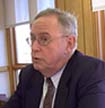By Lucy Komisar
Pacific News Service, Dec 20, 2000
Criminals — drug dealers or dictators — with embarrassing amounts of cash on hand, or corporations trying to avoid taxation, often use false fronts in poor countries to launder the funds. Major U.S. banks are heavily involved in this unsavory business, so banker Robert Rubin  may face some interesting questions from the other members of a UN panel intended to help debtor nations.
may face some interesting questions from the other members of a UN panel intended to help debtor nations.
There is more than a little irony in the appointment of Robert Rubin, a chairman of Citibank, to a United Nations panel which is supposed to propose methods for helping poor countries.
Rubin might have some interesting conversations with another panel member, David Bryer, director of Oxfam — an organization that recently condemned practices of banks such as Citibank as a major part of developing countries’ problems.
Development cannot happen without resources, especially financial resources, UN Secretary General Kofi Annan said when he made the appointment. After a decade of steadily declining development assistance, he said, poor countries are so far in debt that many are paying more in interest and loan payments to industrialized countries than they are receiving in aid from those countries.
Developing countries owe over $2 trillion to rich nations and international institutions such as the World Bank and the International Monetary Fund, and $250 billion of that is owed by the lowest-income countries in the world.
It is vital that we turn the situation around, Annan said. But how?
Bryer might say that one answer is for banks to stop helping officials in developing countries launder money stolen from public funds or received as bribes. Banks also make it easy for rich individuals and corporations doing business in those countries to avoid paying taxes.
Oxfam reported this year that tax havens suck some $50 billion a year out of developing countries — nearly equaling the $57 billion annual global aid budget — six times the estimated annual costs of achieving universal primary education, and almost three times the cost of universal primary health coverage.
Citibank, ![]() with more than $700 billion in assets, is the world’s largest financial services company. Citibank Private Bank, the world’s largest non-Swiss private bank, offers personalized wealth management services for clients through 97 offices in 32 countries including all the major tax havens.
with more than $700 billion in assets, is the world’s largest financial services company. Citibank Private Bank, the world’s largest non-Swiss private bank, offers personalized wealth management services for clients through 97 offices in 32 countries including all the major tax havens.
Citibank claims its private bankers are financial architects, designing and coordinating insightful solutions for individual client needs, with an emphasis on personalized, confidential service. It might have been more accurate to say, We set up shell companies, and secret trusts and bank accounts, and dispatch anonymous wire transfers so you can launder drug money, hide stolen assets, cheat on your taxes, avoid court judgments, pay and receive bribes, loot your country.
It could include testimonials from such prominent former clients as the sons of late Nigerian dictator Sani Abacha, the jailed husband of Benazir Bhutto, former Prime Minister of Pakistan, and Raul Salinas, jailed brother of the ex-president of Mexico. All had Citibank private bank accounts. Minimum balance required: $5 million.
Oxfam figures developing countries lose some $35 billion in taxes from foreign corporations which use creative accounting to move profits to tax havens. The method is simple — a company in country A sets up a subsidiary in a tax haven such as the Isle of Man or the Cayman Islands. It sells product at a low price to the subsidiary which then turns around and sells it to the real buyer at market price. This means the company shows only minimal profits in country A, but does very well tax-free in the haven.
As U.S. Treasury Secretary in the late ’90s, Rubin said publicly, We are very worried about offshore havens, but according to French Finance Minister Dominique Strauss-Kahn, Rubin turned down a proposal calling on the world’s financial powers to cut off offshore centers that fail to properly regulate accounts or cooperate with law enforcement. Rubin denies this but will not discuss the matter.
Jonathan Winer, former Deputy Assistant Secretary of State for International Law Enforcement, says that under Rubin, Treasury was looking to free up economies, not regulate them. There was a strong belief you needed to reduce regulation that could impair the free flow of capital.
 And Jack Blum, co-author of a 1998 report for the UN, Financial Havens, Banking Secrecy and Money Laundering, said U.S. policy was affected by the fact that hot money from the rest of world is fueling one of the greatest booms in the stock market, a lot coming through private banking networks.
And Jack Blum, co-author of a 1998 report for the UN, Financial Havens, Banking Secrecy and Money Laundering, said U.S. policy was affected by the fact that hot money from the rest of world is fueling one of the greatest booms in the stock market, a lot coming through private banking networks.
The UN panel, known as the High-level Panel on Financing for Development, will present recommendations for an early 2002 meeting involving the IMF, the World Trade Organization and the World Bank.
The Fund and the Bank have issued a spate of reports urging attention be given to third world corruption, which they say is blocking development. The reports don’t mention the Western banks that work through the offshore system to launder looted money.

